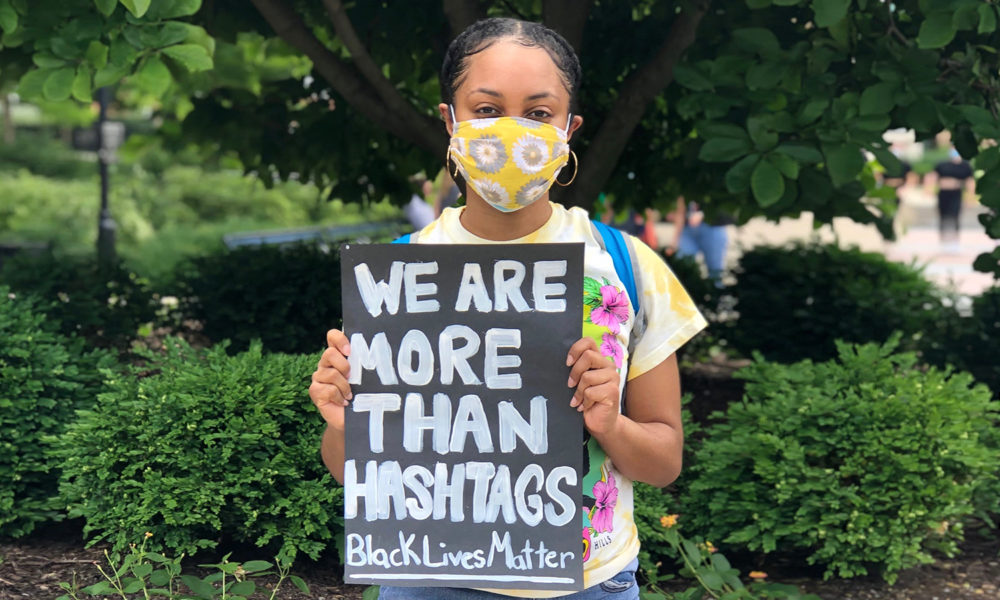These past few weeks, I’ve had to make a choice between writing my doctoral dissertation and protesting for the safety and protection of Black Lives. I chose the latter.
I began my PhD program in July of 2016, a few weeks after the deaths of Philando Castile and Alton Sterling who were both murdered by police officers. Not too long after, I attended my first graduate program retreat, which happened to be at an African American History museum. During the retreat, I felt more secluded in my Blackness as I noticed that many of my peers did not understand that we are still living through many of the same racial injustices depicted in the museum. A desensitization in regards to these instances that seem so long ago to White people, but have impacted me for 26 years of my life. I felt traumatized again by the history of my ancestors and plagued with the current police killings of innocent Black Americans today.
This is just one example of many such experiences throughout my PhD program.
We are currently living in the digital age of police brutality where incidents of unarmed Black people have been recorded for social media viewing. As a Neuroscience Doctoral Candidate, I have been expected to remain productive by analyzing and collecting data. However, as a Black woman I have also had to deal with conflicting perspectives on how I am expected to proceed when I am emotionally exhausted and my mental health is suffering. I inherited the sorrows of my ancestors as I have been filled with grief over the most recent murders of George Floyd, Breonna Taylor, Ahmaud Arbery, Tony McDade, and Sean Reed. I have not been afforded the luxury of ignoring these incidents as systemic racism chokes the air that I breathe.
My non-Black peers and professors are finally attempting to understand my experience as a Black woman scientist. However, what needs to be understood is that systemic racism is embedded in the history of science and is still present today. In 2017, I organized a workshop on Microaggressions in STEM as a way for graduate students and faculty to understand their own unconscious biases. A few days before the event, someone RSVP’d under the alias of Richard Spencer (a well-known white supremacist) and threatened to disrupt the event along with 10 others. The other organizers and I reported this threat to our school’s police department and were met with rehearsed dialogue about how “racism is wrong” without concrete actions to support underrepresented minorities at our institution long term.
The conversation about diversity and inclusion has been ramped in some STEM graduate programs that are working with faculty and students to create a collaborative and discrimination-free environment. Many universities have expressed solidarity by producing statements addressing these racial injustices with discussions about modifying their Diversity and Inclusion Committees (DNI). However, it is not enough to have performative Diversity and Inclusion Committees that have discussions every once in a while about racial biases that have infiltrated systems of higher education. We want to see actionable items to change academic environments that negatively impact Black graduate students through policy modifications. I and many other Black graduate students have been met with many cultural competency issues from administrators who have greeted us as “Dear minority graduate students” in emails. White peers have made negative rebuttals and statements of hate about student organizations bringing light to the Black Lives Matter movement.
If institutions of higher learning want to be allies to Black graduate students, they need to address their own racial biases. Do not only consider our voices when you want feedback on your DNI grants, but ask us to give talks on our research or consider us for administrative positions. Black faculty should be considered in the hiring process and tenured. Universities need to commit to increasing Black student representation in STEM PhD programs and train their staff on how to communicate with Black student recruits. When Black students enter their PhD programs, mental health resources and trained mentors should be accessible and promoted. Also, listen to Black students when we report instances of mistreatment from our PI’s or superiors. Recall instances where you as a non-Black faculty member may have been complicit in this mistreatment by not reprimanding the offender for their actions. It should be mandatory for all faculty to attend training on cultural competency and courses on racism in higher learning, so they are more equipped to support Black graduate students through their journey.
We are living through a racial inequality crisis and non-Black students and academics must join in this fight and defend those who are the most vulnerable. Black students should not be the only ones fighting within their institutions for equity and justice. We’re not here for your quotas. Black students matter. Our people matter.

